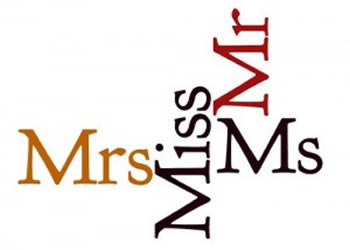Difference between Mrs, Ms and Miss
Key Difference: Mrs is used only for married women. Miss is traditionally used only for an unmarried woman. Ms can be used for a woman, regardless of her marital status. It is the default form of address for women.
 The term Mrs, Ms and Miss are all used as honorific titles for women in English. However, they are not all the same and are used differently in different situations. All three, Mrs, Ms and Miss are abbreviations of the honorific Mistress, which is the feminine of Mister, or Master.
The term Mrs, Ms and Miss are all used as honorific titles for women in English. However, they are not all the same and are used differently in different situations. All three, Mrs, Ms and Miss are abbreviations of the honorific Mistress, which is the feminine of Mister, or Master.
Mrs. (American English) or Mrs (British English) is used only for married women. It may be used as part of her full name, as part last name or surname. However, it is usually not used as only part of the first name. It may also be used as part of her and her husband’s name together, for example: Mr. and Mrs. John Smith. Nevertheless, if the woman has another title such as Dr, Professor, Lady, Dame, Baroness, etc., then those titles should be used forgoing the title of Mrs.
Miss is traditionally used only for an unmarried woman. It is the shortened for of Mistress but a period is not used to signify the contraction. The plural Misses may be used. Similar to Mrs, if the woman has another title such as Dr, Professor, Lady, Dame, Baroness, etc., then those titles should be used forgoing the use of Miss. The title of Miss is also often used for beauty pageants, such as Miss America, Miss World, Miss Universe, etc.

Ms. (American English) or Ms (British English) is an honorific title that is used for a woman, regardless of her marital status. This means that Ms is the safest form to use to address any woman, especially it is unknown if she is married or not, and hence whether to use Miss or Mrs. Ms is the default form of address for women. Again if the woman has another title such as Dr, Professor, Lady, Dame, Baroness, etc., then those titles should be used.
Comparison between Mrs, Ms and Miss:
|
|
Mrs |
Ms |
Miss |
|
Plural form |
Mesdames |
Mss. or Mses. |
Misses |
|
Definition (Merriam-Webster) |
|
|
|
|
Used for |
Form of address for Married Woman |
Default form of address for women regardless of their marital status |
Form of address for a Single woman |
|
Used with |
Either the last name (surname), or full name |
Either the last name(surname), or full name |
Can be used with the first (given) name, last name (surname), full name. |
|
Examples |
|
|
|
Image Courtesy: driverlayer.com, quotehd.com









Add new comment